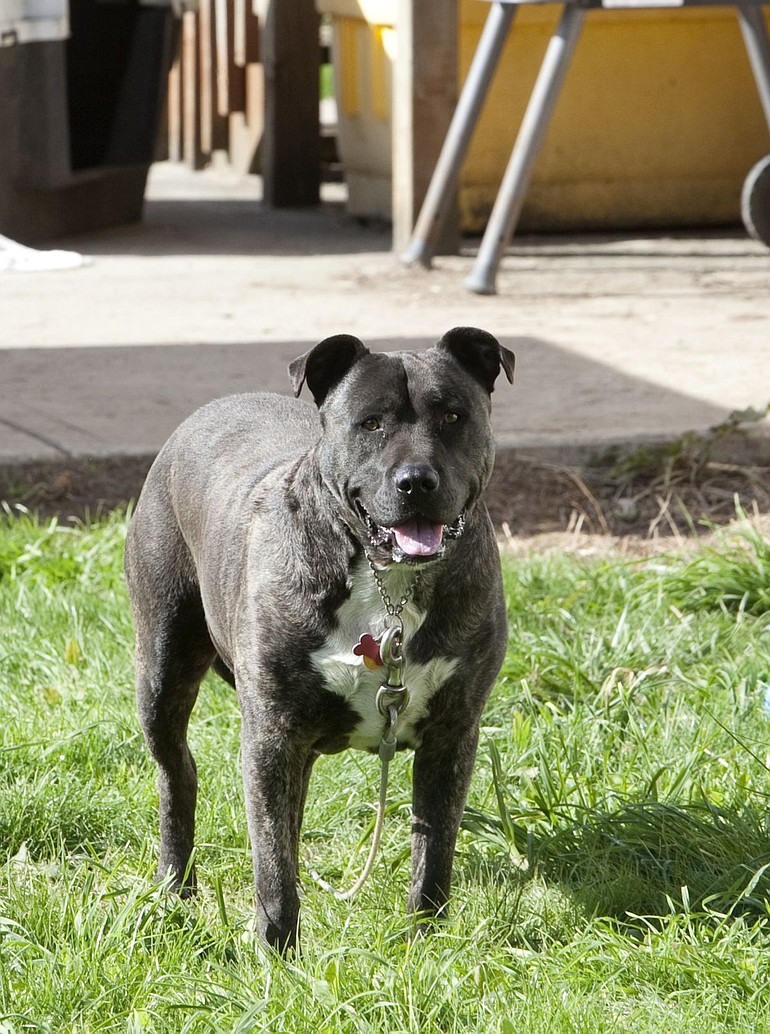The 5-year-old pit bull that garnered the attention of the Battle Ground City Council has now officially led to a city policy change.
The city council on Monday night voted unanimously to amend its animal cruelty regulations to mirror the county’s stricter code. Councilman Phil Haberthur was absent.
The new animal cruelty regulations prohibit dogs from being tied up for more than 10 hours in a 24-hour period or during any inclement weather, such as snow or freezing rain. The code also calls for tethers to be at least five times the length of the dog or a minimum or 10 feet for smaller animals. The tether must also allow the dog to reach shelter, shade, food and water.
Previously, the regulations required a tether at least three times the length of the dog and did not have a time limit.
The council Monday used an emergency provision, meaning the new regulation goes into effect in five days instead of the normal 30 days.
“I believe this is a huge, monumental step forward for us,” Mayor Mike Ciraulo said.
But the council may not be done yet. Several council members expressed interest in prohibiting tethering altogether.
“As far as I’m concerned, anybody who tethers their dog outside and leaves it shouldn’t have a dog,” Councilman Alex Reinhold said. “But I understand we’re government and can’t make you love your dog.”
Reinhold said he would support tethering if dog owners are willing to subject themselves to the same conditions for the same length of time as their dogs are tethered unsupervised.
“If you’re willing to subject yourself to the same garbage you’re willing to put your dog through … I think you guys should suffer together,” Reinhold said.
Councilwoman Lisa Walters, who pushed the council to adopt stricter regulations, also expressed interest in outlawing tethering, calling it inhumane.
Ciraulo directed the city staff to develop a definition of tethering, which is currently not included in the ordinance, and to explore the considerations for eliminating tethering. The issue will be on the agenda of a future council meeting but a date was not set.
The issue was first brought to the attention of the council in August. A neighbor concerned about the welfare of a dog named Bo, a pit bull that is regularly tethered in his fenced yard, approached the council during the public comment portion of a meeting. She asked the council to adopt Clark County’s animal cruelty code.
At the following meeting, Walters asked the city staff to research the issue, and last month, the council directed its staff to draft an ordinance replacing a portion of the city’s code with the stricter county code. Walters and neighbors who advocated for the changes have dubbed the revisions to the code “Bo’s Law.”
Two citizens testified in favor of the amendments to the animal cruelty regulations during the public hearing Monday night. One citizen suggested the council impose stricter penalties for violations rather than pass regulations that are difficult to enforce.
Animal cruelty investigations are complaint-driven, meaning investigations only occur when complaints are made. Outlawing tethering rather than using a time limit would make it easier to enforce the regulations, some council members argued.
Councilman Chris Regan said he would like the city council to explore additional ways to help community members who have animals they can no longer care for.
“Compassionate, concerned citizens who take the initiative to hold their neighbors accountable is part of (the solution),” he said.
Bo’s owner told The Columbian last month that the dog is well cared for and is taken off of the 20-foot tether regularly. She said the dog is tethered while she’s at work because somebody has repeatedly opened the gate and let the dog run free. She did not testify during the hearing.




